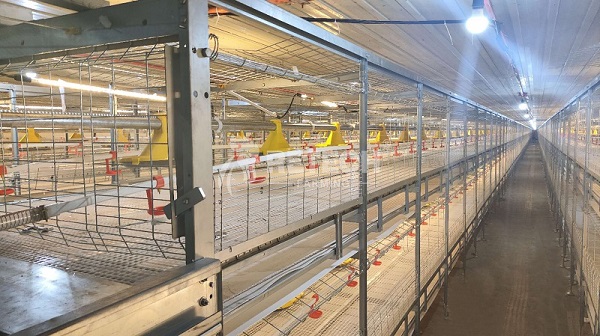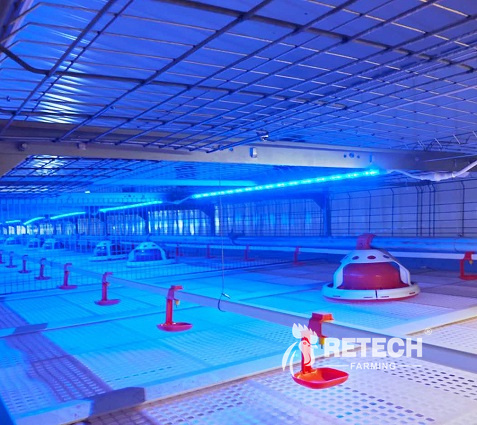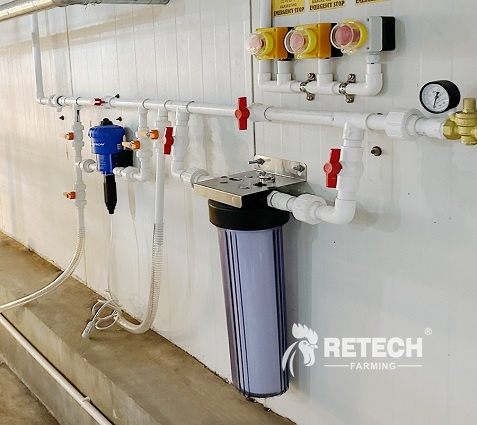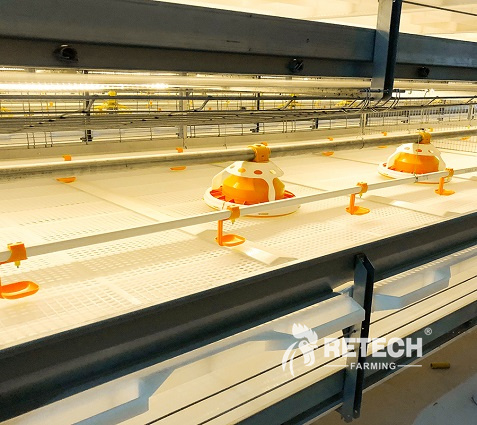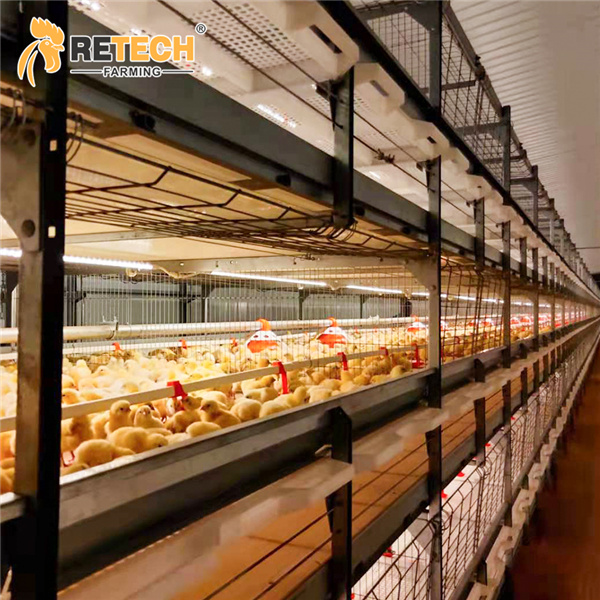Kurera inkoko broiler birashobora kuba umushinga ushimishije, ariko bisaba uburyo bwo gutekereza kubuzima bwabo. Nkatwe, inkoko zitera imbere murugo rwiza, umutekano, kandi muzima. Muri iki gitabo, tuzareba ibyingenzi ukeneye kumenya kugirango ukoreumurima wa broiler ugezwehoku nkoko. Waba umuhinzi w'inkoko ufite ubunararibonye cyangwa ufite amatsiko y'inkoko ufite amatsiko, ubu bushishozi buzafasha gutuma broilers yawe ikura yishimye, ifite ubuzima bwiza, kandi itanga umusaruro.
1.Guhitamo Ahantu heza
1.1 Ibisabwa Umwanya
Kubara umwanya kuri buri nkoko:Ugereranije, buri nkoko ya broiler ikenera metero kare 2 kugeza kuri 3. Ibi birinda ubucucike kandi biteza imbere ubuzima bwiza.
Ntabwo ari ubucucike:Umwanya munini ugabanya imihangayiko, ishobora kuganisha ku iterambere ryiza no gupfa buke.
1.2 Ibidukikije
Kugenzura ubushyuhe kugirango ukure neza:Broilers itera imbere mubushyuhe buri hagati ya 70-75 ° F. Koresha ubushyuhe cyangwa abafana nkuko bikenewe kugirango ukomeze iyi ntera.
Guhumeka n'uruhare rwayo mu buzima:Umwuka mwiza urinda ibibazo byubuhumekero kandi bigatuma amoniya igabanuka. Menya neza ko igishushanyo cyawe gikubiyemo umwuka uhagije.
1.3 Ingamba z'umutekano
Rinda broilers yawe inyamaswa zangiza: Inkoko zifunzekomeza inzoka, imbeba nisazi, urinde inkoko zawe umutekano.
Menya neza ko ibidukikije bifite umutekano:Usibye inyamanswa, ubusugire bwinkoko yawe igomba kugenzurwa buri gihe kugirango wirinde inkoko guhunga.
Igishushanyo mbonera cyubworozi bwinkoko
2.1 Ubunyangamugayo
Ibikoresho byo gukoresha no kwirinda:Hitamo ibikoresho biramba, byoroshye-gusukura ibikoresho. Irinde gukoresha irangi rishingiye ku isasu cyangwa ibiti bivuwe, bishobora kuba uburozi.
Gushushanya kuramba no koroshya isuku:Igishushanyo mbonera cy'igisenge gifasha mumazi, kandi panne ikurwaho irashobora gukora isuku byoroshye.
2.2 Ubushyuhe no Kumurika
Gucunga ubushyuhe imbere mu kazu: Gukingira birashobora gufasha kugumana ubushyuhe buhamye. Witondere guhumeka mugihe ukinguye.
Uruhare rwumucyo karemano nubukorikori: Inkoko zikenera amasaha 14-16 yumucyo kugirango ikomeze gutanga umusaruro. Koresha Windows kumuri karemano n'amatara ya LED kugirango wongere umurikwe.
3 Kugaburira no Kunywa Sisitemu
3.1 Ingamba nziza zo kugaburira
Ubwoko bwibiryo no kubishyira: Koreshasisitemu yo kugaburira byikora hamwe na sisitemu yo kunywabirinda imyanda.
Gahunda nimirire yo gukura neza: Kurikiza gahunda yo kugaburira ibereye broilers. Menya neza ko ibiryo bifite proteyine nyinshi kugirango bifashe gukura byihuse.
3.2
Guhitamo amazi meza: Abanywa ibinini barashobora gufasha kugira isuku no kugabanya isuka.
Kugenzura buri gihe kubona amazi meza: Sukura kandi wuzuze amazi buri munsi kugirango wirinde ikwirakwizwa ryindwara.
3.3 Gucunga ibiryo nisuku yamazi
Uburyo bwo gukora isuku buri gihe: Gusukura buri gihe ibiryo n'amazi kugirango wirinde gukura kwa bagiteri.
Kwirinda kwanduza n'indwara: Bika ibiryo ahantu humye, hizewe kugirango ubungabunge ubuziranenge kandi udukoko twangiza.
4 Gucunga ubuzima n’isuku
4.1 Kugenzura Ubuzima busanzwe
Ibipimo byingenzi byubuzima kugirango ukurikirane: Reba imyitwarire idasanzwe, umuvuduko muke witerambere, nibimenyetso byose byumubabaro.
Igihe cyo kugisha inama veterineri: Niba ubonye ibibazo byubuzima bikomeje, nibyiza gushaka inama zumwuga.
4.2 Kubungabunga Isuku ya Coop
Gahunda nziza yo gukora isuku: Tegura gahunda yisuku ikubiyemo imirimo ya buri munsi, icyumweru, na buri kwezi.
Kurwanya kwanduza no kurwanya parasite: Koresha imiti yica udukoko kandi uhore uvura inkoko zawe kuri parasite.
4.3 Gukingiza no kwirinda indwara
Indwara zikunze kugaragara mu nkoko za broiler: Menya indwara nk'indwara ya Marek na Coccidiose. Ubumenyi nimbaraga mugihe cyo gukumira.
Gahunda yo gukingira hamwe nuburyo bukoreshwa: Korana na veterineri kugirango ushyireho gahunda yo gukingira ijyanye nubushyo bwawe.
Gushiraho urugo rwiza rwinkoko zawe zirimo gutegura neza no kwita kubisanzwe. Ukurikije iki gitabo, urashobora gutanga ibidukikije byiza, umutekano, nubuzima bwiza bwinkoko zawe. Inkoko zishimye kandi zifite ubuzima bwiza ntizigira uruhare gusa mubikorwa byubuhinzi bw’inkoko zirambye kandi zunguka ariko nanone bizana umunezero no kunyurwa kubaborora.
Menyesha nonaha, shaka gahunda yubucuruzi bwinkoko!
Igihe cyo kohereza: Werurwe-07-2024



